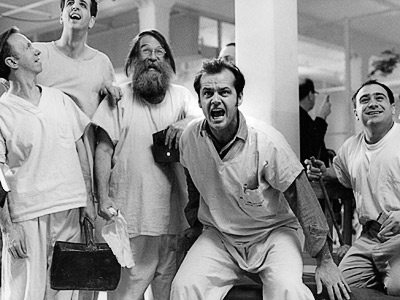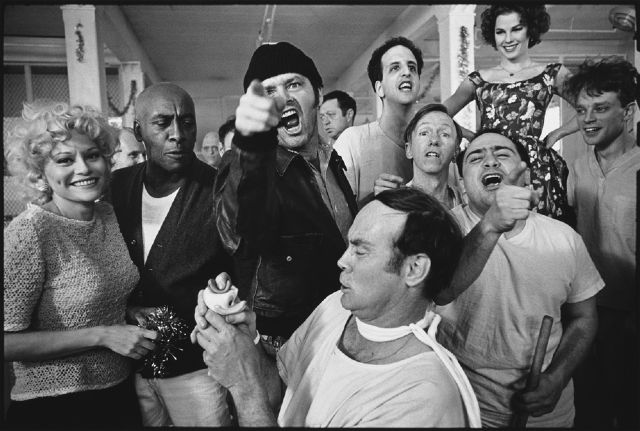McMurphy, a man full of rigor, energy, and most importantly laughter, was puzzled the first time that he sat through a session with the other patients, the doctor, and the Big Nurse. He instinctively realizes that there is something wrong with the place, and rightly points out the Big Nurse as the insinuating criminal. From then on, McMurphy begins an almost heroic quest of restoring individuality, confidence, and manliness to the acutes of the ward who so far lived under the oppression of Ms. Ratched.
However, McMurphy didn’t begin his journey as a self-sacrificing hero. When he first talks to Harding and the other acutes about how Ms. Ratched starts the blood picking with her insinuations, Harding eventually agrees but in a desperate tone adds that “Of course, she always wins, my friend, always. She’s impregnable herself, and with the element of time working for her she eventually gets inside everyone.” This remark stirs the gambling side of McMurphy into a placing a bet whether he will be able to get the better of the Big Nurse or not. Quite possibly beating the Big Nurse was for McMurphy just an exciting gambling game to spend his time during his confinement.
McMurphy’s weapon against Big Nurse and the institution was laughter. To the nurses’ and the black boys’ efforts to aggravate him every possible way they could, McMurphy made himself act more polite and mannerly until he began to see how funny everything is. Not only does he puts his efforts towards beating the Big Nurse, but he also tries to help the acutes regain their manliness and self-confidence, a tendency which gets stronger towards the end, as McMurphy begins to truly care for the acutes on the ward. The way McMurphy tries to help the acutes regain their confidence is by inducing them to laugh. McMurphy believed that one couldn’t be really strong until one saw the funny side of things.
However, McMurphy slightly hesitates in his heroic journey when he realizes through the life-guard that the only way his commitment will end if the Big Nurse frees him. With this realization, McMurphy stops provoking the Big Nurse and chooses to do the smart thing. By this sudden change in his attitude, Ken Kessey successfully portrays McMurphy as not a heroic saint but as a realistic person. Also by depicting McMurphy as standing up for his and the acutes right even after the realization that we will not be freed if he does so, Ken Kessey develops McMurphy from a character who was just gambling and having a good time to a character who is now self-sacrificingly working for the benefit of the acutes.
McMurphy’s efforts show some results in the fishing trip where everybody is laughing together.
“It started slow and pumped itself full, swelling the men bigger and bigger. I watched, part of them, laughing with them – and somehow not with them. I was off the boat, blown up off the water and skating the wind with those black birds, high above myself, and I could look down and see myself and the rest of the guys, see the boat rocking there in the middle ……..swinging a laughter that rang out on the water in ever-widening circles, farther and farther, until it crashed up on beaches all over the coast, in wave after wave after wave.”
Unfortunately, in the end McMurphy is driven to the limit by the Big Nurse and the “Combine” and is eventually forced to take drastic actions. Throughout the book McMurphy developed truly into a Christlike hero who was willing to sacrifice his own life for the patients of the ward. His state of mind can be overlooked in Bromden’s comment about McMurphy’s face: Dreadfully tired and strained and frantic, like there wasn’t enough time left for something he had to do. The patients realize this as well and this is explicitly expressed in the final confrontation between McMurphy and the Big Nurse.
“We couldn’t stop him because were the ones making him do it. It wasn’t the nurse that was forcing him, it was our need that was making him push himself slowly up from sitting, his big hands driving down…. It was us that had been making him go on for weeks, keeping him standing long after his feet and legs had given out, weeks of making him wink and grin and laugh and go on with his act long after his humor had been parched dry between two electrodes.”
With McMurphy’s self-sacrifice, the acutes of the ward regained their self-confidence and manliness and became ready to step back in to the real world once again. What slightly nags me about the ending is how McMurphy didn’t even try and escape when he had the chance. In the night where he decides to take a small nap rather than escape straight away, and in the office room where he stays in his chair although Harding urges him to leave, his actions seems so uncharacteristic of the McMurphy who had been portrayed throughout the novel. Maybe the EST had gotten the better of him and he wanted to rest knowing that now the acutes will be able to continue on without him. I’m not sure, but the ending where Bromden kills McMurphy was truly shocking, though symbolic of Bromden’s total independence.





SPOILER ALERT! Wonderful post full of clever observations. Bromden's descriptions are nice and I like that you picked out that rather poetic one in particular. But I'm not sure how to judge McMurphy as a selfless person, and "Christlike" figure might be a stretch. When was McMurphy purely being selfless? It's debatable, but it is clear that his intentions changed throughout the book, especially towards the end when we could clearly see the values of friendship born among the patients - especially between him and Bromden. The film really mucks that up, IMO. But both the film and the book do build suitable sympathy for him as a character, and yeah - I agree - the ending is a shock. Why didn't he leave? Maybe he was institutionalized?
답글삭제Good blog! I will be sure to reward your efforts.